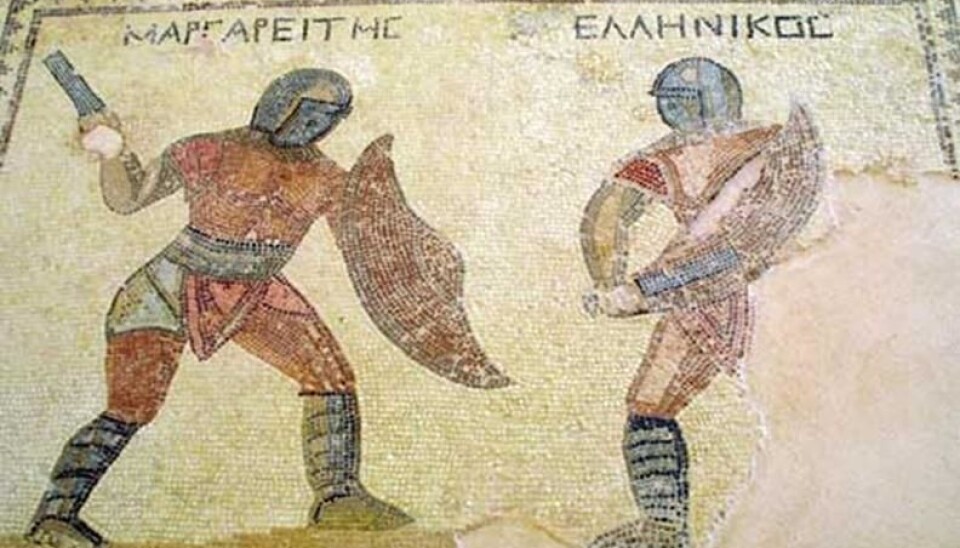An article from University of Oslo

War on neighbouring country to avoid insecurity
Countries go to war against their neighbours just to be on the safe side. Such interventions could be avoided if governments were more concerned with building up credibility, a new study suggests.
Denne artikkelen er over ti år gammel og kan inneholde utdatert informasjon.
Five days after Greek-Cypriot nationalists carried out a coup d’état in Cyprus in 1974, Turkish forces landed on the third largest island in the Mediterranean. Since then Cyprus has been split in two. In the north Turkey has de facto control; the southern part is controlled by the Republic of Cyprus.
Martin Austvoll Nome has studied the prelude to what eventually developed into an occupation in his doctoral thesis Kin State Intervention in Civil War. Nome recently defended his thesis in disputation at the Department of Political Science, University of Oslo.
“There has been a prevailing view in the research that so-called kin states intervene more often in neighbouring countries than other states, but we have little knowledge about the causes of why it should be so. We don’t know enough about the political decision-making processes which take place before the decision to intervene," says Nome.
Therefore it is precisely these decision-making processes that the doctoral candidate has studied. He has used Turkey and Cyprus as examples.
Support their own
“Kin states is the term used for states where the ethnic majority in one country is the same as the ethnic minority in another”, Nome explains.
One example is Turkey and Cyprus as there is a Turkish minority in Cyprus.
Nome explains that it is widely known that kin states often develop policies specifically directed towards the ethnic minority which lives in the neighbouring country.
“To intervene with armed force, that is to say a military intervention, is an extreme example of how kin state relations can affect policy”, says Nome.
Nome has a particular wish to find out which conditions must exist for such a military intervention to occur. He had an hypothesis:
“My assumption was that a precondition for intervention is that the power relationship in the country where the ethnic grouping is in the minority has the potential to change rapidly and sharply. If the majority grouping fails to convince the minority that their position will not be weakened, kin states may choose to send in their military to support their own people”, he says.
Lack credibility
The dynamic which can build up to intervention Nome has chosen to call a “credibility problem”.
“If the majority succeeds in convincing the minority that the power relationship will not be disturbed, there will be no grounds to intervene. The assumptions and expectations as to what will occur in the near future are therefore decisive for whether an intervention occurs, says Nome.
He believes the situation in Cyprus in the 1960`s and 70`s contributes to underpinning this hypothesis.
In 1960 the colonial power Great Britain withdrew from Cyprus. With their newly won independence the Greek-Cypriots, who composed the greatest part of the population on Cyprus, and the Turkish-Cypriots, who were in the minority, had together to work out how the island should be governed. Attempts to shape a new co-existence ended with riots and disturbances.
Greek-Cypriot nationalist groups wanted Cyprus to become a part of Greece. Turkish-Cypriots feared their autonomous rights would be weakened – or in the worst case: that they would be chased out of Cyprus. With the coup in 1974 the Turkish-Cypriots’ fear and insecurity intensified.
"The coup the Greek-Cypriots conducted in 1974 was sponsored by Greece. It is therefore a very good starting point for the study of the Credibility Theory. There is little doubt that there were strong forces at work which desired a unification with Greece. Greek-Cypriots had therefore a tough job of convincing Turkish-Cypriots about anything else," says the researcher.
Fieldwork on Cyprus
Nome has been to Cyprus and interviewed several of the central politicians on the island from the 1960`s and 1970`s. He has also interviewed particular Turkish politicians, and studied written diplomatic correspondence from Turkey and Cyprus in the period before Turkey`s intervention.
"Both the interviews and the correspondence show that the Turks and Turkish-Cypriots did not believe the Greek`s assurances that the Turkish Cypriots position would not be weakened. The fear that Cyprus would be incorporated into Greece was strong. In 1974 Turkish-Cypriots comprised 18 percent of Cyprus` population. If they had been incorporated into Greece they would have become a very small minority."
“In this context the fear can be understood. It can be discussed to what degree it was well substantiated. What is meaningful, is that regardless it was perceived as reality by the decision-makers at that actual point in time”, he says
To give a better foundation for this hypothesis on the significance of credibility, Nome has also studied Cyprus anno 1964. In that year Greece sent forces to Cyprus to support the Greek-Cypriots in the disturbances which had broken out between Greek-Cypriots and Turkish-Cypriots after the British withdrawal. Despite this Turkey did not intervene.
"The situation in 1964 was very much like that in 1974- when Turkey chose to intervene. Why didn’t they do so in 1964? Judging from the political discussion at that point in time, it appears that the Turks in 1964 feared that the Turkish-Cypriots’ position would be weakened to a much lesser degree than in 1974," says Nome.
In addition, emphasizes Nome, British forces after urging from the UN intervened in the conflict. This also contributed to the Turks feeling more secure about their position being preserved.
Credibility must be built up
Nome believes that, all in all, the situation on Cyprus in 1964 compared with 1974 shows that credibility specifically is a keyword for whether an intervention will occur or not.
One can take lessons from several situations, he believes – and emphasizes that he is as interested in the credibility problem in and of itself as much as the specific situation on Cyprus in the 1960`s and 70`s.
“The credibility problem will for example be central in the conclusions of civil wars. How can one ensure the other party that a peace agreement will be kept? It is a question which will be central in Syria, which is a conflict with a range of groups involved. This is an area which requires more research”, explains Nome.
He believes likewise that some lessons can be drawn from his own study, and thinks his findings can be used in policy development.
“My thesis shows that intervention can perhaps be avoided if you are more attentive about building up credibility, and by securing the presence of a neutral and effective third party”, he says, and adds:
“If the coup instigators in Cyprus in 1974 had read my thesis, they might have dropped the coup –they would have understood that the price would be too high”.
































